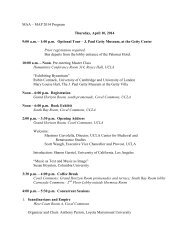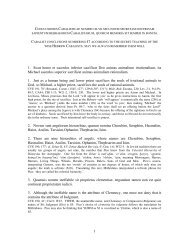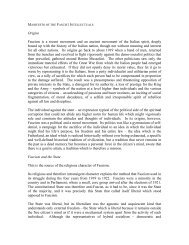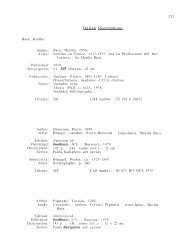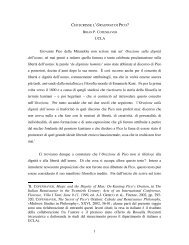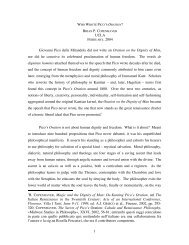1 (1) Pythagoras of Samos instructed the region of Italy once called ...
1 (1) Pythagoras of Samos instructed the region of Italy once called ...
1 (1) Pythagoras of Samos instructed the region of Italy once called ...
You also want an ePaper? Increase the reach of your titles
YUMPU automatically turns print PDFs into web optimized ePapers that Google loves.
or ‘Platonian,’ resulting in qualities <strong>of</strong> ‘Platonicity’ or ‘Platonism’ or ‘Platonianism.’ But<br />
I see no way for ‘Platonity,’ a noun that does not arise from an adjective <strong>of</strong> quality, to<br />
signify quality.<br />
(13) What to say when some (not counted among <strong>the</strong> ancients) have added ‘identity,’<br />
‘whatness’ and ‘itness’ – ‘same thingness,’ ‘what thingness’ and ‘that thingness,’ in o<strong>the</strong>r<br />
words? Such expressions are not far from <strong>the</strong> absurdity <strong>of</strong> ‘initselfness,’ ‘thishereness’<br />
and various o<strong>the</strong>rs that even Crassus would have found ridiculous, no less so than <strong>the</strong><br />
thing that made him laugh at least <strong>once</strong> in his life, according to Lucilius. 98<br />
(14) Actually, I have found no substantives based on adjectives that end in -eus and<br />
signify a material – ‘woodiness’ from ‘woody,’ ‘marbleness’ for ‘marble,’ ‘ironness’<br />
from ‘iron.’ These are not adjectives <strong>of</strong> quality, I believe, to which ‘mine,’ ‘yours’ and<br />
‘his’ are somehow similar, and I have never heard <strong>of</strong> a ‘mineness,’ ‘yourness’ or<br />
‘hisness’ coming from <strong>the</strong>m. Some legal authories venture to use this last one,<br />
none<strong>the</strong>less, but <strong>the</strong>y do not even understand <strong>the</strong> proper use <strong>of</strong> <strong>the</strong> pronoun. On <strong>the</strong> quite<br />
difficult application <strong>of</strong> this word and <strong>of</strong> ‘his,’ its root, I have recently written a little book<br />
dedicated to Giovanni Tortelli <strong>of</strong> Arezzo. 99 But if <strong>the</strong>se nouns in -itas, which also signify<br />
quality according to Boethius, do not come from all adjectives, how much less likely is it<br />
that <strong>the</strong>y come from substantives?<br />
5 THERE IS NO DIFFERENCE BETWEEN ‘ESSENCE’ AND ‘TO BE’ WITH THE ARTICLE, AND<br />
LIKEWISE WITH OTHER TERMS LIKE ‘WILL’ AND ‘TO WILL’ WITH THE ARTICLE.<br />
(1) Now I come to <strong>the</strong> predicaments; for <strong>the</strong> first <strong>of</strong> <strong>the</strong>se (as I have shown) Quintilian<br />
says ‘essence’ is <strong>the</strong> correct translation. 100 This is what he says elsewhere about this<br />
word: ‘Many words are formed from Greek, especially by Sergius Flavius, and <strong>the</strong>y are<br />
just as crude as “abling” and “essence;” why we should have such scorn for <strong>the</strong>m I fail to<br />
see, except that we criticize ourselves unfairly and <strong>the</strong>n struggle with an impoverished<br />
language.’ 101 In one <strong>of</strong> his letters, Seneca denies that to on and hê ousia can be expressed<br />
in Latin. 102 (2) Preferring not to translate ousia word for word, Boethius used<br />
‘substance,’ which is hupostasis in Greek. As a result, when ‘substance’ is applied not to<br />
its Greek equivalent but to a different term, some inevitably use <strong>the</strong> Greek term<br />
‘hypostasis’ in place <strong>of</strong> a Latin term. Clearly, it was not because Boethius shunned <strong>the</strong><br />
98 Zippel cites Cic. Fin. 5.92; identify Crassus, Lucilius ???<br />
99 Zippel cites Angelo de Periglis, Tractatus suitatis, in Tractatus universi iuris (Lyon, 1541), I, 7; and Ad<br />
Ioannem Tortellium Aretinum cubicularium apostolicum de reciprocatione sui et suus liber, written by<br />
Valla in 1449-50; identify Tortelli ??? The possessive pronouns – ‘mine’ (meus), ‘yours’ (tuus), ‘his’<br />
(suus) and so on – were <strong>of</strong> special importance in law for describing claims <strong>of</strong> possession and ownership.<br />
They are declined like adjectives, but suus, related to <strong>the</strong> reflexive pronoun sui, is more restricted than <strong>the</strong><br />
o<strong>the</strong>rs in its syntax, applicable only to <strong>the</strong> subject <strong>of</strong> <strong>the</strong> clause in which it appears.<br />
100 Above, 1.6.<br />
101 Zippel cites Quint. 8.3.33; above, n. 25 on Flavius and Plautus; <strong>the</strong> participle quens is an unusual form <strong>of</strong><br />
<strong>the</strong> defective verb quire, ‘to be able,’ probably itself a back-formation from nequire, ‘to be unable,’ but<br />
modern editions <strong>of</strong> Quintilian have queentia.<br />
102 Zippel cites Sen. Ep. 58.6-8; <strong>the</strong>se are Greek words for ‘being’ and/or ‘essence.’<br />
26<br />
2/21/05 9:35 PM 26/44



